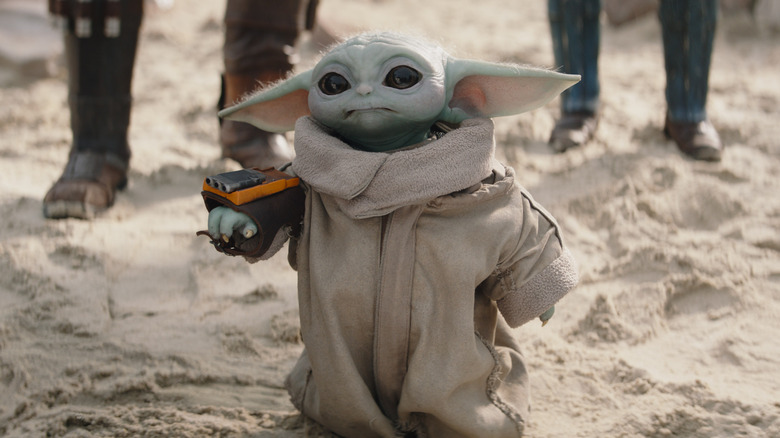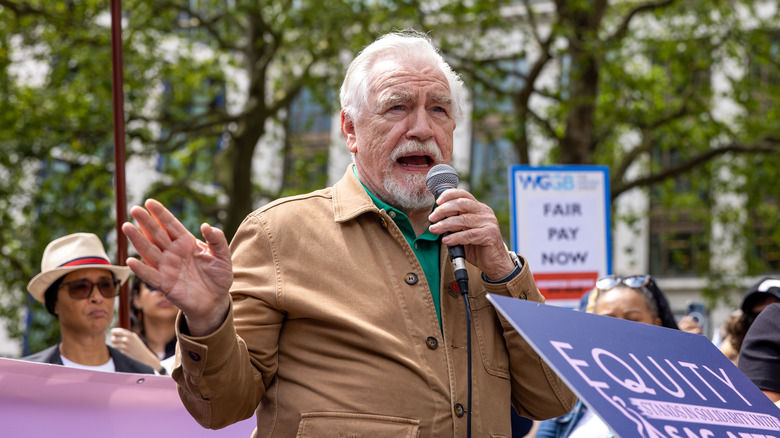Star Wars: A Mandalorian Extra Exposes Disney's 'Uncomfortable' Scan Experience
A "Star Wars" extra has come forward with her story about AI scanning, a core issue in the ongoing strike by the SAG-AFTRA actors' guild against exploitative practices in the television and film industry. Nicole Kreuzer, who worked on Disney's massively successful "The Mandalorian" as an extra, recounted being scanned digitally for insertion in other scenes, describing the experience as "uncomfortable."
Kreuzer, who does stand-in work for 5'9" blondes according to Capital and Main, is routinely an extra, the term for nonspeaking actors who fill scenery. Such work is the ground floor for those pursuing a career in acting, but it is compensated poorly and goes uncredited. Hollywood unions see background actors as among the most susceptible to the encroaching depredations of AI technology, which threatens to do away with background acting as a category of work. When allegedly scanned on "The Mandalorian," Kreuzer recounted being told, "We can make you leap over buildings. We can make you fight."
The WGA and SAG-AFTRA are both on strike, the first time the two most powerful workers' unions in Hollywood have concurrently stopped work since 1960, with AI being a major sticking point for both associations. On the writing side, studios could hope to generate scripts using large language model AIs, abbreviated as LLMs, while on the acting front, actors are routinely scanned so their likenesses can be used after they have left set. Such technology is already well established; it is likely that you have already seen an AI actor in a major production.
Scanning is one reason why unions oppose AI practices
Nicole Kreuzer's experience of having her likeness allegedly scanned for "The Mandalorian" is not unique. Kreuzer and those who do similar work are commonly paid only for work they do on-set, with no additional compensation doled out for the scanning process nor any fees paid when it's used. SAG-AFTRA has included protections against such practices as a pillar of its demand package in negotiations with AMPTP, the organization representing studios.
At a London solidarity rally in July, "Succession" star Brian Cox told the Associated Press, "I think we are at the thin end of a horrible wedge...The wages are one thing, but the worst aspect is the whole idea of AI and what AI can do to us. AI is the really, really serious thing. And it's the thing where we're most vulnerable."
Kreuzer claims she was promised that she'd receive more work on "The Mandalorian" but that such promises never came to fruition. "If I had said no to the scan and they sent me home that day," she said, "I would never have been called back. But they never called me back anyway." For the day's work, she was paid $170. She has no inkling of where else her image was used. Leah Caruana, another background actor, spoke to the Los Angeles Times in July and shared her trepidations regarding AI. She specifically recounted one occasion when she allegedly hid in the bathroom to avoid being scanned.
As Hollywood relies more on technology, flesh-and-blood workers like Kreuzer worry they're being left behind. Whatever the outcome of what some have termed a "hot labor summer," it will reshape the industry for decades to come.
This piece was written during the 2023 WGA and SAG-AFTRA strikes. To learn more about why writers and actors are currently on strike, click here for an up-to-date explainer from our Looper team.

